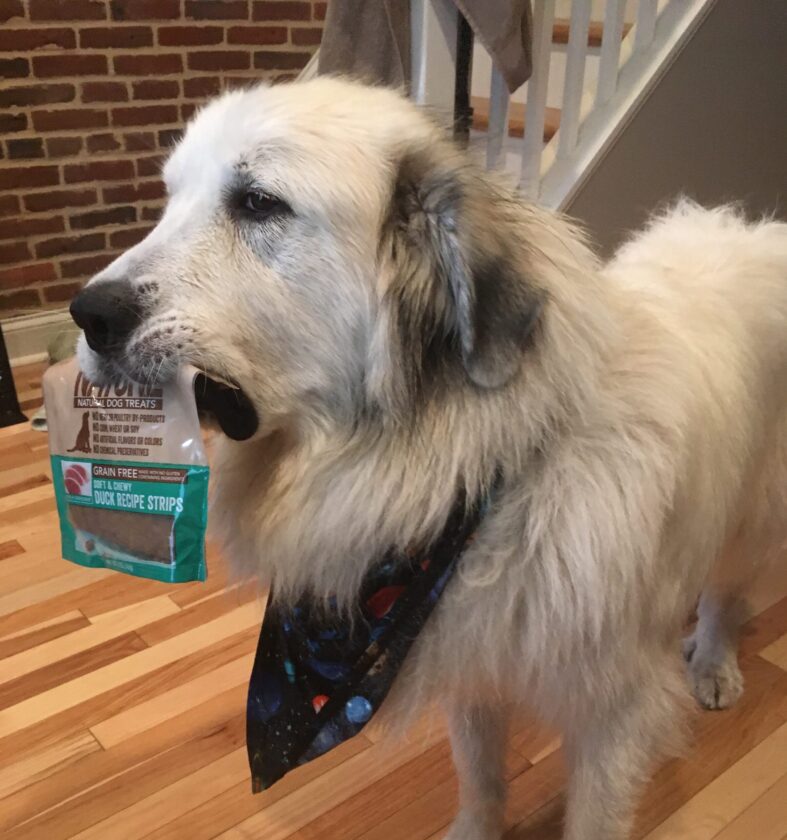
Foods To Avoid With Your Great Pyrenees
Written by Ariele Sieling
Have you got big, sad puppy dog eyes, staring at you as you eat your dinner? Or as you open a bag of chips while watching TV? Or when you grab a quick snack after exercising?
A Great Pyrenees look of desperate desire for the food you’re eating can be hard to resist.
Not to mention, it can be fun to give your pup a delicious treat or share in whatever food you’re eating. It’s almost like bonding.
But it’s worth being careful. There are many foods that a dog’s digestive system wasn’t designed to consume—even if it’s safe for you!
Overall, it’s best to stick to a diet for your Pyr that was recommended by your vet, and vet-approved treats.
Now, you’ve probably heard that you shouldn’t give your dog chocolate. Chocolate contains theobromine which is a natural chemical found in the cocoa plant. It’s a stimulant and is very dangerous to dogs—too much of it can poison them.
You may have also heard to avoid onions, which can cause anemia, weakness, and difficulty breathing. And grapes (including raisins), which can lead to kidney failure.
But there are many other foods that you may not have heard of.
Xylitol is a sweetener commonly found in different varieties of candy and diet products. This can cause a Pyr’s blood pressure to suddenly drop. It can also cause seizures. So don’t sneak your pup any of your leftover Halloween candy or low-calorie dessert or low-calorie peanut butter, at least without checking the label first!
Caffeine is a powerful stimulant (as we all know!). If consumed by a Pyr, it can lead to restlessness, heart palpitations, and potentially death. Be careful with where you leave your half-finished latte!
Nuts are another food to avoid, especially walnuts and macadamia nuts. A lot of people snack on nuts year-round, and particularly during the holiday season. But this is one of those fun human-only snacks it is best to avoid sharing with your pup. These delicious treats can cause anything from vomiting, hyperthermia, weakness, and an inability to stand or walk in your pup. If consumed with chocolate, they can also lead to kidney failure. Be very careful with nuts.
Medicine—this is really a no brainer, but a curious and clever Pyr can get into pretty much any cabinet. Don’t leave your medicines out on the counter—hide them the same way you would from a toddler. Many of the active ingredients even in over-the-counter medication are extremely toxic to pets, potentially causing ulcers, liver damage, kidney failure, and even death.
So what can you share with your Pyr?
Well, meat is typically fine, though it is best to avoid cooked fats like the skin on chicken or the big lumpy fat on steaks or roasts. In addition, a dog should never consume cooked poultry bones, as the bones can splinter and cause problems in their digestive tract.
Vegetables are also good—cooked or uncooked. Carrots, green beans, cucumbers slices, and zucchini are all okay. If you’re tempted to share potatoes with your Pyr, just make sure they are plain and cooked. No unripe potatoes or potato plants.
Fruits are also a great option, particularly apple, orange slices, bananas, and watermelon. Just be sure you’ve removed any seeds!
Bread is also fine, as long as it is cooked and there are no nuts or raisins added, as is plain rice or pasta.
And remember—you can always share dog treats with your pup while you enjoy your own human-friendly snack!
That said, accidents do happen! (One time my friend’s dog knocked a chocolate cake off the counter and ate the whole thing when she was out of the room for a minute—the dog was fine, but they were very worried!)
If you are ever worried about your Pyr, you can always call your vet. In the case of an emergency contact the ASPCA Animal Poison Control Center: (888) 426-4435.
Common signs of poisoning include muscle tremors, vomiting, diarrhea, excessive drooling, red skin, ears, and eyes, swelling, and bleeding.
